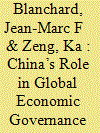|
|
|
Sort Order |
|
|
|
Items / Page
|
|
|
|
|
|
|
| Srl | Item |
| 1 |
ID:
175855


|
|
|
|
|
| Summary/Abstract |
A large proportion of debates about China’s impacts on global economic governance lack systematic empirical analysis. We engage the debate about if China is a revolutionary, revisionist, or status quo state through a deep dive into China’s behaviors with respect to Bilateral Investment Treaties (BITs). This research strategy is à propos because BITs represent the de facto regime governing foreign direct investment (FDI) globally, and China is the world’s second largest signatory of BITs. Drawing upon a database that we created using material on BITs available from the United Nations Conference on Trade and Development, we systematically examine the substantive and procedural provisions of China’s BITs from 2000 onward. Using a qualitative methodology discussed in-depth in our article, we also put China’s BIT practices in comparative perspective by comparing them against the BIT practices of Japan, a leading developed economy with BIT practices reflecting those of other established economies. Our multivariate analysis demonstrates China is not a revolutionary or dramatically revisionist player with respect to BITs. It champions positions that are neither hyper-conservative (state friendly) nor hyper-liberal (FDI friendly). To be more precise, China’s policies, especially with respect to substantive provisions, tend to be conservative, with, to some extent, some liberal aspects. Our analysis, then, indicates that commentators, businesspeople, and policymakers should be cautious about proffering claims that China is dramatically reshaping global economic governance. Aside from this important contribution to the debate, our work also expands knowledge about China’s BITs specifically and BITs generally, which does not reflect adequate attention to BITs from East Asian countries.
|
|
|
|
|
|
|
|
|
|
|
|
|
|
|
|
| 2 |
ID:
138919


|
|
|
|
|
| Summary/Abstract |
In 2008, the European Union (EU) decided to include aviation in its Emissions Trading System (ETS) in order to realize emissions reductions in the aviation sector. However, the unilateral measure has triggered strong opposition from various actors, and now, the EU finds itself in the middle of a substantial power struggle about the creation of a global scheme for international aviation emissions reduction. China plays an important role as it has not only banned its airlines from complying with the EU ETS, but also implemented economic retaliatory measures, such as freezing orders of new European Airbus aircraft. Consequently, Beijing could successfully form coalitions with other countries to dilute international negotiations at the International Civil Aviation Organization (ICAO) assembly in 2013. The study reveals the hardships that the establishment of a global carbon emissions reduction scheme for aviation faces. It discusses the leading role of the EU on the issue, and provides a general assessment of possible responses to the aviation directive. It then analyzes China’s position on the inclusion of aviation under a global carbon reduction scheme. Finally, the study provides a prospect on how to overcome the diplomatic struggle in order to achieve concrete carbon emission reductions in aviation. As the study concludes, the EU and the rest of the world would be better off by refraining from unilateral mitigation measures and emphasizing more involvement, engagement, and capacity building in negotiating a possible carbon reduction scheme at the international level.
|
|
|
|
|
|
|
|
|
|
|
|
|
|
|
|
|
|
|
|
|